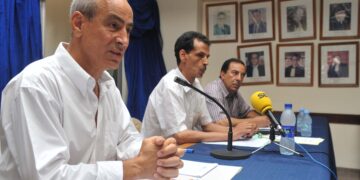In this FAQ, we provide answers to common questions about DAWN's referral to the International Criminal Court (ICC) regarding the role of U.S. officials in supporting Israeli war crimes in Gaza.
— Why are you urging the International Criminal Court (ICC) to investigate American officials?
DAWN has urged the ICC prosecutor to investigate and prosecute former President Biden, State Secretary Blinken and Defense Secretary Austin for their personal roles in aiding and abetting Israeli war crimes, crimes against humanity, and genocide in Gaza as part of hisongoing investigation into the situations in Palestine since 2014. Aiding and abetting such crimes is itself an international criminal offense, and the ICC, as the world's sole permanent international criminal court, is the proper venue for prosecuting such crimes. Critically, because there is no option for these officials to face prosecution for their crimes in the United States, we have urged the court to investigate them.
–What evidence do you have that American officials committed any crimes?
DAWN's 172-page submission to the ICC provides extensive evidence about the role of each of Biden, Blinken and Austin in aiding and abetting the commission of crimes under the Rome Statute, the ICC's founding treaty that defines the crimes over which it has jurisdiction. The submission details the actions and intentions of these officials to provide Israel with military, diplomatic, and public support to facilitate the commission of crimes in Palestine. This military support includes not only the nearly $18 billion in weapons these officials secured for Israel, which Israel needed to commit its crimes, but also the intelligence gathering, military operations, and combat operations they ordered to facilitate Israel's unlawful actions in Gaza. The diplomatic support these officials provided, including vetoing seven United Nations Security Council Resolutions, helped Israel withstand efforts to stop its crimes in Gaza. Their public support, justifying Israeli atrocities helped ensure popular sympathy for Israeli war crimes, crimes against humanity, and genocide. We believe this evidence meets the jurisprudential threshold for liability under Articles 25(3)(c) and (d) of the Rome Statute, both for aiding and abetting and intentionally contributing to crimes.
–Why prosecute Biden administration officials while President Trump is proposing even worse crimes?
American officials who have aided and abetted such crimes can and should be prosecuted regardless of whether they are still in power or others are committing equally bad or even worse offenses. This is important both to establish that no one – not even officials of the world's greatest superpower – is immune from compliance with the law. Such prosecutions can discourage other officials, including President Trump, from committing new crimes by challenging their belief that they enjoy complete impunity.
–What is an Article 15 submission anyway?
An "Article 15 submission" to the ICC refers to the Rome Statute's mechanism for sending communications to the Office of the Prosecutor providing information about alleged crimes that fall under the court's jurisdiction, such as war crimes, crimes against humanity, or genocide, which could potentially trigger an investigation by the prosecutor if deemed credible enough. Article 15 communications are the primary way that civil society organizations, individuals, and even victims, can provide information and evidence to the court.
–Why should an international court prosecute Americans when the U.S. isn't even a member of the court?
The ICC has jurisdiction over the territory of the State of Palestine (the Gaza Strip, West Bank, and East Jerusalem), including crimes committed by foreign nationals in that territory, whether or not they are citizens of countries that are members of the ICC. The court's Pre-Trial Chamber recently confirmed this principle. Accordingly, the crimes committed by Israeli nationals in the State of Palestine, and any actions to aid and abet those crimes, fall under the court's jurisdiction.
–How does President Trump's new executive order against the ICC and the sanctions the Treasury Department imposed on Prosecutor Karim Khan impact civil society organizations communicating with the ICC?
DAWN submitted its communication to the ICC urging the Prosecutor to investigate Biden, Blinken and Austin on January 24, 2025, before President Trump imposed sanctions against the court with an Executive Order on February 6, 2025 including sanctions on Prosecutor Khan. Accordingly, DAWN's submission is not subject to the prohibitions of Executive Order.
Under the Order, only a "foreign person" may be sanctioned for directly or indirectly supporting the ICC's work as laid out in the Order. This includes indirect engagement such as providing "material assistance," "material support," or "services to or in support of" those efforts. However, these key terms are undefined in the order and its implementing regulations. In a challenge to the prior executive order by the first Trump administration on the ICC, a U.S. federal court enjoined enforcement of the order in light of its chilling effect on the exercise of First Amendment rights. It is thus uncertain whether the provision of additional information to the ICC by U.S. persons in connection with the investigation into violations of the Rome Statute in Palestine following the establishment of the new Executive Order would be deemed to violate its terms or whether the Executive Order would withstand constitutional challenges.







































